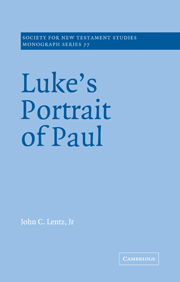7 - Conclusion
Published online by Cambridge University Press: 10 December 2009
Summary
The purpose of this work was to investigate the Lucan portrayal of Paul. The evidence suggests that Luke was highlighting, if not creating, Paul's high social status and moral virtue. By the end of Acts, the Paul who has been described is, quite frankly, too good to be true.
Two questions remain: why would Luke have done this? To whom was Luke writing? It would presume too much to seek complete answers here. However, our study suggests a certain direction in which to go to resolve these crucial queries.
The majority of present day scholars are convinced that Luke-Acts was written for a specific Christian community. Furthermore, there is a growing consensus which describes Luke as a pastor writing to assuage the anxiety of his congregation in the time in between Jesus' ascension and his return. Issues such as the Church's relationship to Judaism and the individual Christian's relationship to Roman authority, among others, are at the forefront of this supposed Lucan community.
However, the very style and substance of Acts does not fit this hypothesis. From the opening dedicatory preface to Theophilus in Luke to the close of Acts where Paul is preaching unhindered in the capital of the empire, the mood of Luke's work is expansive and evangelistic, not introspective and defensive. Luke-Acts was written as much for the non-believer as the believer.
- Type
- Chapter
- Information
- Luke's Portrait of Paul , pp. 171 - 172Publisher: Cambridge University PressPrint publication year: 1993



